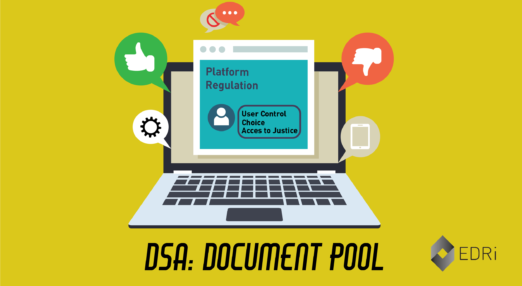e-commerce directive
Filter by...
-

Digital Services Act / Digital Markets Act: Document pool
The DSA-DMA package will affect how intermediaries regulate and influence user activity on their platforms, including people's ability to exercise their rights and freedoms online. It also aims at limiting the abuse of power by very large and gatekeeper platforms.
Read more
-

Interoperability: A way to escape toxic online environments
The political debate on the future Digital Services Act mostly revolves around the question of online hate speech and how to best counter it. Whether based on state intervention or self-regulatory efforts, the solutions to address this legitimate public policy objective will be manifold. In its letter to France criticising the draft legislation on hateful […]
Read more
-

A privately managed public space?
Our “public spaces” online where we meet each other, organise, or speak about social issues, are often controlled and dominated by private companies (platforms like Facebook and YouTube). Pushing platforms to decide which opinions we are allowed to express and which not is not going to solve major problems in our society. The EU rules […]
Read more
-

Hate speech online: Lessons for protecting free expression
On 21 October, David Kaye – UN Special Rapporteur on the promotion and protection of the right to freedom of opinion and expression – released the preliminary findings of his sixth report on information and communication technology. They include tangible suggestions to internet companies and states whose current efforts to control hate speech online are […]
Read more
-

Trilogues on terrorist content: Upload or re-upload filters? Eachy peachy.
On 17 October 2019, the European Parliament, the Council of the European Union (EU) and the European Commission started closed-door negotiations, trilogues, with a view to reaching an early agreement on the Regulation on preventing the dissemination of terrorist content online. The European Parliament improved the text proposed by the European Commission by addressing its […]
Read more
-

E-Commerce review: Safeguarding human rights when moderating online content
This is the fourth and last blog post in our series on Europe’s future rules for intermediary liability and content moderation. You can read the introduction here. In our previous blog posts on the upcoming E-Commerce review, we discussed examples of what can go wrong with online content regulation. But let’s imagine for a moment […]
Read more
-

E-Commerce review: Mitigating collateral damage
This is the third article in our series on Europe’s future rules for intermediary liability and content moderation. You can read the introduction here. Asking social media and other platform companies to solve problems around illegal online content can have serious unintended consequences. It’s therefore crucial that new EU legislation in this field considers such […]
Read more
-

More responsibility to online platforms – but at what cost?
In the European Commission’s internal note published by Netzpolitik.org on 16 July 2019, the Commission presents current problems around the regulation of digital services and proposes a revision of the current E-Commerce Directive. Such a revision would have a huge impact on fundamental rights and freedoms. This is why it’s crucial for the EU to […]
Read more
-

E-Commerce review: Technology is the solution. What is the problem?
This is the second article in our series on Europe’s future rules for intermediary liability and content moderation. You can read the introduction here. When it comes to tackling illegal and “harmful” content online, there’s a major trend in policy-making: Big tech seems to be both the cause of and the solution to all problems.
Read more
-

E-Commerce review: Opening Pandora’s box?
The next important battle for our rights and freedoms in the digital sphere is looming on the horizon. While the public debate has recently focused on upload filters for alleged copyright infringements and online “terrorist” content, a planned legislative review will look more broadly at the rules for all types of illegal and “harmful” content.
Read more
-

Open letter: Regulation on terrorist content online endangers freedom of expression
On 18 March 2019, together with seven other organisations, EDRi sent a letter to Members of the European Parliament (MEPs), to share our concerns with regards to the draft Regulation on preventing the dissemination of terrorist online content. The European Parliament Committee in Civil Liberties, Justice and Home Affairs (LIBE) is set to vote on […]
Read more
-

Commission claims that general monitoring is not general monitoring
Will everything we do on the internet be monitored and checked against by a non-transparent mechanism that decides what can be published? It is a real threat, and currently it is coming from an area that patently does not require such draconian measures: EU copyright law. This threat is a peculiar one, because there are […]
Read more
